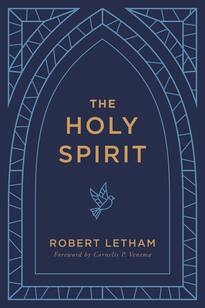
Robert Letham
Reviewed by: Robert T. Holda
The Holy Spirit, by Robert Letham. P&R, 2023. Paperback, 376 pages, $22.90. Reviewed by OP pastor Robert T. Holda.
Oh, how I wish I had access to this incisive and balanced teaching on the third person of the Holy Trinity in my youth! Perhaps like many of you, I grew up in faith communities that did not consistently offer me clarity and wisdom regarding the person and work of God’s Spirit, but often and sadly encouraged my own natural tendency toward confusion and folly.
In The Holy Spirit, intended to be the first in a trilogy on the three persons of the Godhead, Letham does a masterful job of combining historical, biblical-theological, practical, and even polemical modes of instruction regarding the Spirit of God. He consistently takes a Reformed viewpoint and offers much-needed critiques of Pentecostal theology and practice, especially in his appendix. His writing is clear, orderly, concise, and consistently bears the marks of charity and humility.
The first section summarizes the historical development of the church’s understanding of the Holy Spirit without much comment. Although these chapters were slightly dry, I know I will turn back to them as a handy historical and theological resource. What was more helpful was Letham’s summary of the Nicene Creed’s teaching on the Holy Spirit (ch. 4). I was personally refreshed by the somewhat shocking reminder that, as “the Lord and Giver of Life,” the Holy Spirit personally “gives life to the vegetation, the trees and plants around us, and sustains it” (86). How many of us live as practical deists, overlooking the Spirit’s ongoing work in creation?
Although the author’s explanation of New Testament teaching on God’s Spirit was very good, I found his chapter on the Holy Spirit’s work in the Old Testament even more enlightening. There, passages that are not often set side by side are brought together to provide a worthy summary of Old Testament revelation on the Spirit’s old covenant activities.
Regarding New Testament Gifts (ch. 9), Letham includes a survey of many charismata, or gifts of the Spirit. Here, he provides an evenhanded, honest evaluation of the prevailing descriptions of the extraordinary spiritual gifts. He includes thoughts from a variety of scholars and often makes provisional conclusions. As one who can easily desire more certainty than the Scriptures provide, I found this humbling, though it strengthened my convictions in those truths about the Spirit’s person and work that are certain.
Chapter 11 offers the church much-needed help in discerning where the Spirit is at work in the world today. After asserting his expectation that the Spirit of God is still doing “great and amazing things . . . in the means of grace” (255), Letham points our attention to wherever Christ is being glorified, the gospel is being preached and believed, the fruit of the Spirit is growing, where loving service is present, and where the saints are working hard. Here, the author expressly rules out the possibility that the Spirit is at work in the celebrity culture in the church, where some leader, and not Christ, is being glorified, and where, instead of self-control, what flourishes is “uncontrolled spontaneous, ecstatic phenomena such as protracted hysterical laughter, barking like dogs, and howling like hyenas” (258).
Although this book could serve well in a seminary curriculum, it is also accessible enough for the average layperson to understand. It is useful and trustworthy enough to quickly enrich any believer’s understanding of the Holy Spirit. Letham achieves this by an easy writing style and by offering multiple helps, such as a glossary of terms, reflection questions, and lists of resources for further study. I highly recommend this book.
March 30, 2025
On the Trail with a Missionary
March 23, 2025
Midnight Mercies: Walking with God Through Depression in Motherhood
March 16, 2025
March 09, 2025
Zwingli the Pastor: A Life in Conflict
March 02, 2025
February 23, 2025
African Heroes: Discovering Our Christian Heritage
February 16, 2025
© 2025 The Orthodox Presbyterian Church